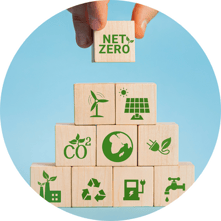Are you a Carbon Net Zero hero?
.png)
Are you ready to be a climate champion?
With Co2 being the most abundant greenhouse gas causing issues in our atmosphere, it’s up to us to reduce, remove and seek low-carbon alternatives to try and minimise the levels of carbon dioxide we’re producing.
Our planet is warming at an alarming rate thanks to us, so we’re the only ones that can slow it down and try to reverse the damage we’ve caused.
Are you ready to take on the challenge?
What does ‘Carbon Net Zero’ actually mean?
The term ‘Carbon Net Zero’ may sound complicated, but it’s actually pretty simple, really.
If a brand says their goal is to be ‘Carbon Net Zero’, it means they’re doing their absolute best to find alternative solutions to the big carbon causes in their company.
Ultimately, they’re trying to have little, to no, carbon emissions.
A tricky task, but so important.
Carbon Neutral v.s Carbon Net Zero
Carbon Net Zero
Carbon Net Zero is all about reducing your carbon output. It’s about finding long-lasting solutions to the carbon problem.
Those aiming for this will have a science-based reduction target in place to help keep our overall global warming below 1.5℃. They will then also compensate for any remaining hard-to-decarbonise emissions by using certified carbon credits.
Carbon Neutral-1.png?width=221&height=221&name=Blog%20Pictures%20%20(1)-1.png)
Whereas if a company is striving to be Carbon Neutral, it means they just have to offset any greenhouse gas emissions they produce, rather than reduce them.
So, for example, if a company is producing ‘x’ amount of carbon, they don’t have to stop producing that, they just have to find a way to show they are taking the same amount of carbon out of the atmosphere.
Both are great for the environment, but being Carbon Net Zero is considered better.
Our Carbon Net Zero journey so far
Back in 2019, we became the first UK promotional merchandise company to become a Certified B Corporation.
This not only means we’re part of a global community of companies using business as a force for good, but it means we’re redefining what success in business looks like.
It’s all about balancing profit and purpose and reinforcing our brand’s vision of Meaningful Merchandise and Exceptional People.
In July 2020, we announced our commitment to becoming Carbon Net Zero by 2030, alongside over 700 other Certified B Corporations.
And since then we’ve achieved a lot!
- We’re now ISO 9001 & 14001 UKAS certified for our environmental management systems.
- We have committed investment into solar and wind farms which are producing energy right now!
- We’ve launched an Electric Vehicle Lease Scheme for all team members.
- In 2020 we moved into our brand new HQ which is super energy efficient. It’s powered by solar panels and is a BREEAM Excellent building through 3rd party certification.
Why by 2030?
The main goal of COP26 was to uphold the promises made in the 2015 Paris Agreement of keeping the planet’s temperature rise below 1.5℃.
To achieve this, it was outlined that we would need to stop burning fossil fuels and cut our global emissions by 45% by 2030, and reduce them to 0% by 2050.
However, we and many other Certified B Corps wanted to do better than this and set the challenge of becoming 0% by 2030 instead of 2050.
And we were eager to take on this challenge!
You can read more about our carbon net zero journey here.
How to start your Carbon Net Zero journey
We understand that becoming Carbon Net Zero overnight is quite frankly impossible. We also understand that even taking the first steps towards it can seem very daunting. Where do you even start?
That’s why we wanted to share with you the three key areas we focused on at the start of our Carbon Net Zero journey, to enable you to start planning and considering your own.
1) Measure.png?width=221&height=221&name=Blog%20Pictures%20%20(6).png)
It’s always a good starting point to know just how much carbon you’re actually producing.
By measuring your greenhouse gas emissions, like gas boilers, company cars, how you generate electricity, and all other indirect emissions from your supply chain, you can then set your own science-based targets.
2) Reduce.png?width=221&height=221&name=Blog%20Pictures%20%20(4).png)
You can now start planning how you can reduce your overall energy consumption.
Why not switch to a renewable energy supplier (we love Good Energy)? Or you can introduce an electric vehicle lease scheme for your team, or encourage them to use public transport or walk to work instead, if possible.
It’s time to identify and focus on tackling the areas where you can make the most impact on your carbon footprint.
3) Offset.png?width=221&height=221&name=Blog%20Pictures%20%20(5).png)
Thirdly, look at how best you can carbon offset. Even with the steps above it’s likely that there may still be some emissions you can’t totally remove. Carbon offsetting is a way of purchasing carbon credits to balance this out.
We’re on our way to Carbon Net Zero by 2030
We’re currently right on track to be Carbon Net Zero by 2030. Boom!
We love working with other great brands that care about our planet. That’s why we’ve collated all our favourites into one handy brochure for you to browse.
Download your B Corp & Social Enterprise brochure now, or get in touch for your free consultation with one of our Merchandise Consultants.


